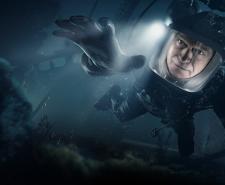
In Ross Kemp: Deep Sea Treasure Hunter, the TV personality and host travels further around the world to dive even deeper on shipwrecks of major historical importance
Deep sea diving is very different to your average SCUBA dive. It requires specialist training from highly experienced diving professionals and is usually a vocation rather than a hobby. The Professional Association of Diving Instructors (PADI) defines dives from 18 to 30 metres as deep dives and the amazing things you can see at those depths make it a fascinating experience. The diver’s equipment and abilities must both be high enough to match the requires of a more complex and deep dive. Here we’re exploring some more amazing facts about deep sea diving.
1. World’s Deepest Dive Set in 2014
The world’s deepest dive was recorded at 332.35 metres performed by an Egyptian diver, Ahmed Ahdel Gahr. The record was set in 2014 and recorded as Mankind’s Deepest Dive.
Commercial divers have also gone deeper, with their depth reaching 534 metres, as they worked to connect an underwater pipeline. There have also been fascinating deep dives down to shipwrecks, with the deepest wreck dive recorded at 205 metres, diving the Yolanda Wreck in Egypt in 2005.
The ability to go deep and explore the unknown is fascinating and understandably each diving team wants to beat the records of the last.
2. Jacques Cousteau invented the Aqua-Lung
The first example of diving equipment was developed by Jacques Cousteau in 1943. Called the ‘Aqua- Lung’ the breathing cylinder allowed divers to breathe underwater for the first time. The Aqua-Lung was the first open-circuit, fully self-contained underwater breathing apparatus. It allowed Cousteau and his partner Emile Gagnan to film and explore underwater more easily.
3. There’s No Colour Underwater
Well, that’s not quite true. Once you go deeper than 10 metres human eyes can no longer see colours such as red and yellow. Almost everything has a bluish tinge and the spectrum of visible light is reduced as you get further from our source of light, the sun.
4. Decompression Sickness is common the deeper you go
When deep sea divers head under water they rely upon a mixture of nitrogen and oxygen. The mixture they breathe is known as enriched air nitrox or EAN. When deep sea divers are underwater, they need to have more oxygen in their lungs in order to prevent decompression sickness.
Decompression sickness is common for divers as it happens as you rapidly descend beneath the sea. The nitrogen gas built up inside your body quickly expands and develops into bubbles. These bubbles quickly become trapped in your joints and can cause severe pain. Divers who experience decompression sickness require treatment via hyperbaric oxygen therapy using a recompression chamber.
5. Identifying sound underwater is nearly impossible for humans
Sound moves at least five times faster underwater than it does in our atmosphere. This means it is almost impossible to work out where a sound is coming from. On land our understanding of sound is dependent on the time it takes for it to hit our right and left ear. Different technologies are necessary to help you hear underwater well, usually on submarines and other vessels, not when out diving.
6. Man can be crushed by water
The deepest level we have reached as divers is known as the Hadal zone. The Hadal Zone is found in the depths of Mariana Trench which is in the Pacific Ocean and regularly explored by deep sea divers. The water pressure at this level is approximately 1000lbs per square inch. Your body can withstand this pressure for short bursts of time but too long and it will begin to crush the body. Going much deeper means the risk of pressure increasing and crushing is even higher.
7. Do the risks outweigh the gains?
The skill level necessary to become a deep sea diver is not for everyone (unless you’re Ross Kemp). Many people make it their life’s work and a treasured career while a smaller number consider diving a hobby and a passion. Every dive needs to be carefully planned and executed to precision to ensure it is safe and can be fully enjoyed.
The time and dedication necessary to become a skilled diver is worth it when you get the chance to see underwater sights that very few others have had the pleasure of witnessing.





















